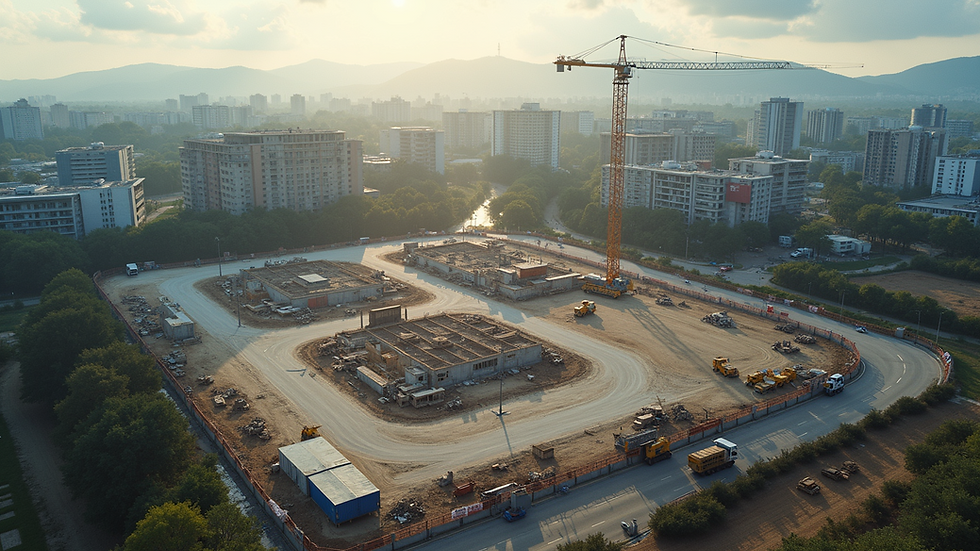How to Effectively Manage a Construction Project
- Aswalolla Praneeth
- Aug 4, 2025
- 4 min read
Managing a construction project can often feel like navigating a labyrinth. With multiple moving parts, diverse teams, and the constant pressure of deadlines, effective management is crucial for success. Whether you're overseeing a small renovation or a large commercial project, understanding key aspects can help streamline the process and mitigate issues. This post will explore various strategies and tips that are essential for effective construction management.
Understanding Construction Management
Construction management is the process of planning, coordinating, and controlling a construction project from its inception to completion. It involves various stakeholders, including contractors, subcontractors, architects, and clients. Each of these parties plays a vital role in the project's success, emphasizing the need for strong communication and collaboration.
Effective construction management encompasses several key elements: project scope definition, budgeting, scheduling, risk management, and quality control. By learning how to manage these areas effectively, construction managers can ensure that projects are completed on time and within budget.

Key Components of Effective Construction Management
To manage a construction project effectively, consider focusing on the following key components:
1. Project Scope Definition
Defining the project scope sets the foundation for the entire construction process. This means clearly outlining what the project will entail, including specific deliverables, schedules, and expectations. A well-defined scope minimizes the chances of scope creep, where additional tasks are added without proper planning.
For example, if a team is tasked with building a new office space, the project scope should specify the number of floors, square footage, and specific amenities. A comprehensive scope document should also include any regulatory requirements and compliance standards relevant to the construction site.
2. Budgeting and Financial Management
A well-planned budget is crucial for any construction project. Understanding costs — including labor, materials, permits, and unforeseen expenses — can help you stick to your financial plan. Start by creating a detailed budget that includes all estimated costs and review it regularly throughout the project.
In fact, studies show that 80% of construction projects face cost overruns. Keeping a close eye on expenditures is essential. Utilizing budgeting tools can help you track your spending in real time and make adjustments as necessary.

3. Team Collaboration and Communication
Successful construction projects rely heavily on effective communication among all team members. Regular meetings and updates can help ensure everyone is on the same page, whether that involves discussing timelines, safety protocols, or changes to the project scope.
Using project management software can enhance collaboration by allowing team members to share updates in real time. Ensuring that everyone has access to necessary documents and information is vital to fostering a successful working environment.
4. Scheduling and Time Management
Creating a realistic schedule is fundamental for on-time project delivery. Use tools like Gantt charts or critical path method (CPM) scheduling to visualize timelines and the interdependencies between different tasks.
It is often beneficial to build in buffer time for potential delays caused by weather conditions, supply chain issues, or labor shortages. By anticipating setbacks, you can manage client expectations more effectively and reduce stress on your team.
5. Risk Management
Every construction project comes with a set of risks — both foreseen and unforeseen. Effective risk management involves identifying potential risks, assessing their impact, and developing a response plan. Common risks include accidents on the job site, project delays, or material shortages.
For instance, consider conducting regular site safety inspections and training sessions to mitigate the risk of accidents. By being proactive, you can significantly lower the chance of incidents that could derail the project and lead to higher costs.

Importance of Quality Control
Quality control is not merely a final check but should be an ongoing process throughout construction. By ensuring that all materials meet industry standards and that work is performed competently, you can minimize issues that may arise once the project is completed.
Developing a clear quality assurance plan before construction begins can set the standard for excellence. Regular inspections and employing qualified personnel are also crucial factors in maintaining high-quality standards.
Tools and Technologies for Construction Management
Embracing modern tools and technologies can significantly enhance your construction management capabilities. Building Information Modeling (BIM), for instance, allows you to create digital representations of physical and functional characteristics of the project. This tool can improve collaboration and efficiency, allowing all stakeholders to visualize the project together.
Project management software like Procore or Buildertrend can also streamline various aspects of construction management, from budgeting to scheduling and communication. These platforms facilitate easier collaboration and tracking for construction teams.
Building Strong Relationships with Stakeholders
Building and maintaining strong relationships with stakeholders is vital for project success. This includes everyone from clients to subcontractors, suppliers, and even the community. Open communication and transparency can help build trust, which often facilitates smoother project execution.
Taking the time to understand stakeholders' needs and expectations can go a long way. Regularly seeking feedback can yield vital insights that may improve project efficiency and outcome.
Final Thoughts on Construction Management
Effectively managing a construction project requires a multifaceted approach. By focusing on project scope, budgeting, communication, scheduling, risk management, and quality control, you can significantly increase your chances of success. Combining these strategies with modern technologies can streamline the process even further.
For those looking to hire experts, consider working with professional building contractors who can bring invaluable experience and insights to your project management efforts. With the right tools and trusted partners, effective construction management becomes a achievable goal.




